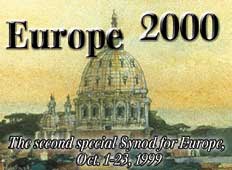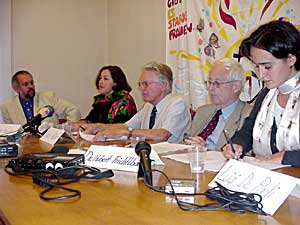

 |
 |
|
|
Lay groups call for conversion in the hierarchy By JOHN L. ALLEN JR.

Inside the synod hall, the lay voice has been dominated by the so-called “new ecclesial movements” – Focolare, Communion and Liberation, and the Neocatechumenate. On Monday morning, however, another sort of lay movement spoke up in Rome – and had some defiant things to say. The event was a press briefing sponsored by the Forum of European Catholics and the International Movement We Are Church, two umbrella groups of progressive Catholics in Europe. Over the weekend the groups staged a “shadow synod” at a retreat center 30 miles outside Rome to protest what they regarded as the exclusion of lay input in the official synod process. More than 120 people from 11 nations participated. The final documents are available on-line in English and Italian: http://www.we-are-church.org/forum/. “The most urgent need facing the Catholic church is for a conversion within the hierarchy,” said Elfriede Harth, a German-born Catholic living in France and the spokesperson for We Are Church. “They must embrace a more inclusive model of governance if they are to regain the trust and respect of Catholics in Europe who feel alienated by high handed decisions from church leadership,” Harth said. The We Are Church movement was born in Austria in 1995, when more than a half-million people (out of one and one-half million active Catholics) signed a petition demanding reform in five areas, including clerical celibacy, women’s ordination, and local control of the church. The petition spread to Germany and elsewhere, eventually netting three million signatures. Especially in German-speaking regions of Europe, the movement is considered an important force in church affairs. Several dozen journalists crowded into a small room five minutes away from the Vatican on Monday to listen to the presentation – one indication of how desperate most of them are for something of substance to report, given the tight stage-management that surrounds the synod. At the news conference, speakers stressed changes in power-sharing and governance. Hubert Feichtlbauer, chair of the Austrian branch of We Are Church, said that this did not betoken any change in the group’s original agenda. “This is more than a structural question,” he said. “I want to know if I pray to a God who does not want women at his altar.” Resolving this question, Feichtlbauer said, will require changes in church governance so that the people of God can cooperate in shaping church policy in keeping with the teaching of Vatican II. “The Catholic faithful are no longer little children, to be dismissed by bishops and cardinals with a wave of the hand or a papal pronouncement,” said Isaac Wüst, a former priest from the Netherlands. “We have grown into mature and responsible adults in the faith, ready and willing to share both the burden and the responsibility of decision-making.” At the conclusion of the “shadow synod,” participants produced a document that they placed in a large yellow envelope and attempted to deliver to the pope Monday afternoon. It wound up in the hands of a slightly mystified member of the Swiss Guard outside a Vatican gate in St. Peter’s square. A spokesperson for We Are Church said the group had faxed an earlier version of the statement to Belgian Cardinal Jan Schotte, who runs the synod, on Saturday afternoon. Entitled “Give Hope to Europe!”, the document calls for support for debt relief and a more just distribution of resources; inter-religious dialogue; tolerance of contraception; a married priesthood; full equality of women and men within the church; allowing divorced and remarried persons to receive the sacraments; full regard for the rights of homosexual persons; and the use of positive language in presenting church teaching. The group also called for a “representative council” to provide for statutory government within the church. The body would provide for full participation of all the people of God in decision-making, including the appointment of bishops. The group urged that the bishops’ synod be converted into a real decision-making body with power to govern the church, instead of offering “suggestions” to the pope. Feichtlbauer stressed that the reformers were not seeking to sweep away the offices of bishop or pope. “The Catholic church needs a structure,” he said. “We are not trying to say everybody should just do as he or she pleases. We want to cooperate with the office-holders in the church. But we have a motto: ‘Not against the bishops, but if it is their wish, we will do it without them.’” Harth rejected suggestions that reformers should simply become Protestants if they are discontent with the Catholic church. “My identity is as a Catholic,” she said. “I protest, but I am a Catholic.” John L. Allen Jr. may be reached at JLA12065@aol.com National Catholic Reporter, October 12, 1999 |